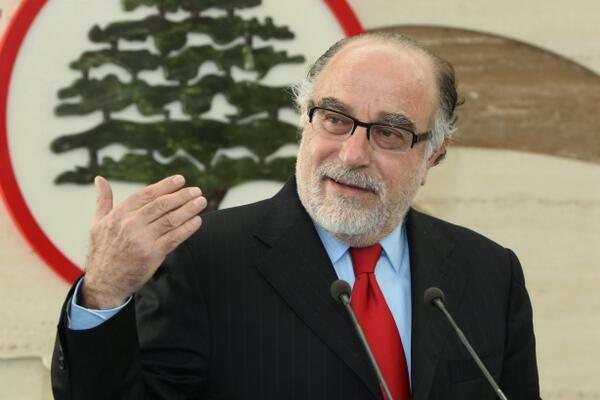January 03-2014

The Lebanese Sunni political leader blown up Friday in Beirut had just drafted a letter to President Rohani asking him to withdraw support from Hezbollah or watch as Lebanon dissolves.
A massive car bomb killed Mohamad Chatah, 63. Chatah was a former finance minister, a former ambassador to the US and a prospect to become prime minister. He was a Sunni leader known as a quiet moderate. He died only a few hundred meters from the spot where Prime Minister Rafik Hariri, whom Chatah had supported, died in 2005 from a similar car bomb.
The Wall Street Journal published the text of a letter it said Chatah had written last week and was circulating for signatures among Lebanese political figures.
Chatah said Lebanon was collapsing largely because of the power of the Hezbollah militia to bring society to its knees. “Today, more than ever before, the choices made by the Islamic Republic of Iran will play an important role in determining our success or failure. That’s why we are writing to you.”
He said, “For us, as representatives of the Lebanese people, the real test is not so much whether Iran reaches a final agreement with Western powers … [but] whether Iran is genuinely prepared to chart a new course in its policies toward the rest of region, and most specifically toward Lebanon.”
Chatah laid out the Lebanese complaints about Iranian policy in Lebanon.
“It is an undisputed fact that Iran’s Revolutionary Guard continues to maintain a strategic military relationship with Hezbollah, a military organization that Iran’s Revolutionary guard was instrumental in establishing 30 years ago. At that time, Lebanon was still in the midst of a terrible civil war and southern Lebanon was under Israeli occupation.
“Today, 23 years after the end of the civil war and the disbanding of all other Lebanese militias, and 13 years after the liberation of the south from Israeli occupation (in which the Lebanese resistance played a crucial role), Hezbollah continues to maintain an independent and heavily armed military force outside the authority of the state. This is happening with the direct support and sponsorship of your country.
“As we are sure you would agree, the presence of any armed militia in parallel to the legitimate armed forces of the state and operating outside the state’s control and political authority is not only in conflict with the Lebanese constitution, but also with the very definition of a sovereign state—any state….
“Moreover, the use of—or implied threat of using—Hezbollah’s weapons advantage to tilt the domestic political playing field has made the delicate task of managing the Lebanese political system almost impossible, and has led to a gradual systemic paralysis.”
Right now, he said, the main concern is Hezbollah’s role in Syria. It is widely believed that Hezbollah sent troops into Syria only after urging from Tehran.
Chatah said Lebanon is now being engulfed by blowback from Hezbollah’s Syria adventure.
“Combating this scourge and protecting Lebanon from worse spillovers cannot succeed while a major Lebanese party is participating directly in the Syrian conflict,” Chatah wrote. “It is, in effect, an invitation to those on the receiving end of Hezbollah’s bombs and bullets in Syria to bring the war back to Hezbollah’s homeland—our common homeland. Regrettably, this is happening with the support of, and in coordination with, the Islamic Republic of Iran.”
He then asked Rohani to help Lebanon achieve peace, first by joining an international declaration recognizing Lebanon as a neutral state and then by “ending all armed participation by Lebanese groups and parties, including Hezbollah, in the Syrian conflict.”
Essentially, Chatah said that in Lebanon Iran has already achieved the power and influence it seeks throughout the region. But he said it was a power being used to do ill, not good.
With Chatah’s death, it is not known what will happen to the letter. But his death has likely put more focus on the ideas in the letter and the charge—heard widely in Lebanon but little noted abroad—that Iranian policies are sinking Lebanon as a state.
